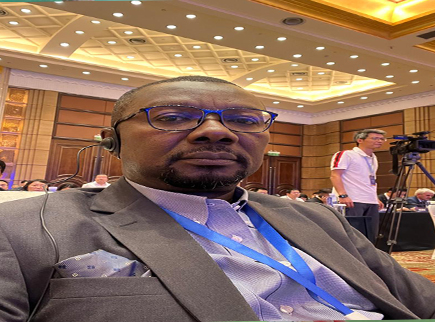Accra, Nov. 16, GNA – Mr Albert Kofi Owusu, General Manager of the Ghana News Agency (GNA), has urged media institutions across the Global South to work collectively to reclaim the global narrative by telling their own stories with accuracy, context and cultural representation.
Speaking during a panel discussion at the Global South Media and Think Tank Forum held in Johannesburg, South Africa, Mr Owusu said developing nations could no longer afford to allow external media structures and algorithm-driven digital platforms to define their image.
The event was held from November 12–14.
He said the dominance of Western media, coupled with rising misinformation and artificial intelligence systems that poorly represent African and Southern realities, continued to distort global perceptions of developing countries.
“If we do not tell our stories, others will, and they will not tell them well,” he said, calling for coordinated South–South media collaboration.
Mr Owusu proposed the creation of a South–South news content exchange supported by artificial intelligence tools built for African and Southern contexts.
The initiative, he noted, should prioritise local languages, cultural expression, shared development interests and cross-border reporting.
“We must build AI systems that understand our languages, our geographies and our realities,” he said, adding; “If algorithms do not understand us, they will erase us.”
Mr Owusu said the digital future of African languages and cultures depended on deliberate investment in technology, data infrastructure and collaborative storytelling platforms that amplify voices across the Global South.
The Global South – broadly referring to developing countries in Africa, Asia, Oceania, the Caribbean and Latin America – has long argued that global information flows are dominated by a few powerful media entities in the North, often resulting in skewed representations of Southern societies, economies and political systems.
Mr Owusu said the time had come for Southern countries to correct those imbalances through unified action.
The Johannesburg forum, which attracted about 230 media executives and heads of think tanks, was co-hosted by the Chinese Government and Xinhua News Agency.
The event, held on the theme: “Reforming Global Governance: New Roles and Visions for China–Africa Cooperation,” explored how developing countries could secure fairer representation in global systems and strengthen cooperation on media innovation, research and policy advocacy.
Mr Owusu praised China’s continued investment in Global South media partnerships, describing the country’s commitment to the Global South Initiative as a demonstration of “ambition, innovation and strategic partnership.”
He said China’s experiences offered lessons for African nations seeking to build stronger institutions and transform their development trajectory.
He also highlighted recent calls by African leaders, including Ghana’s President John Dramani Mahama and Kenya’s President William Ruto, for Africa to secure a permanent seat on the UN Security Council – noting this was part of a wider push for a more just and inclusive international order.
“Africa cannot simply react to global agendas; we must set them,” he said, urging stronger collaboration between media outlets and think tanks across the Global South to drive evidence-based journalism, influence global policy conversations and amplify perspectives often ignored in mainstream global media.

